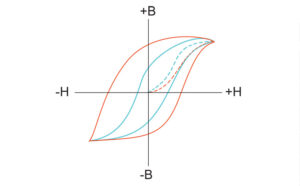Table of Contents
Magnetic permeability is the relative increase or decrease in the resultant magnetic field inside a material when compared to the magnetising field in which the given material is located, or the property of a material equal to the magnetic flux density B established within the material by a magnetising field divided by the magnetising field strength H.
Thus, magnetic permeability (Greek mu) is defined as μ = B/H. Magnetic flux density B is a measure of a material’s actual magnetic field as a concentration of magnetic field lines, or flux, per unit cross-sectional area.
The magnetising field produced by electric current flow in a wire coil is measured as magnetic field strength H.
Magnetic materials can be classified based on their permeabilities.
A diamagnetic material’s constant relative permeability is slightly less than one. When a diamagnetic material, such as bismuth, is exposed to a magnetic field, the external field is partially ejected, and the magnetic flux density within the material is slightly reduced.
A paramagnetic material has a relative permeability that is slightly greater than one. When a paramagnetic material, like platinum, is exposed to a magnetic field, it becomes slightly magnetised in the direction of the external field. The relative permeability of a ferromagnetic material, such as iron, is not constant. As the magnetising field increases, the relative permeability increases reaches a maximum, and then decreases.

Magnetic Permeability Definition
The magnetic induction to magnetic intensity ratio is used to calculate magnetic permeability. It is a scalar quantity denoted by the symbol. Magnetic permeability is a measure of a material’s resistance to a magnetic field or the extent to which a magnetic field can pass through it. The greater a material’s magnetic permeability, the greater its conductivity for magnetic lines of force.
Factors Affecting Magnetic Permeability
Permeability is also affected by factors such as the material’s nature, humidity, position in the medium, temperature, and frequency of force application. Magnetic permeability is always positive and varies with magnetic field strength. Magnetic reluctance, on the other hand, is the inverse of magnetic permeability.
Magnetic Permeability Materials
- Materials that are diamagnetic
Diamagnetic materials have a constant relative permeability that is slightly less than one, which results in a slightly reduced magnetic flux density inside diamagnetic materials. In external magnetic fields, diamagnetic materials are weakly repelled.
- Materials with Paramagnetic Properties
Because paramagnetic materials have a constant relative permeability slightly greater than one, when they are placed in an external magnetic field, they become feebly magnetised in the direction of the magnetic field. Platinum is an example.
- Materials with Ferromagnetic Properties
The relative permeability of ferromagnetic materials is not constant. The relative permeability of pure iron and many alloys is greater than 100000, and as the magnetising field increases, so does the relative permeability. As a result, ferromagnetic materials have the most powerful magnetic properties. Iron is an example.
Also read: Paramagnetic Materials
FAQs
What is magnetic permeability and how is it measured?
(μ) = B/H magnetic permeability Where B denotes magnetic intensity and H denotes the magnetising field. Magnetic permeability is measured in henries per metre (H/m) or newtons per ampere squared (NA2).
Where does magnetic permeability come into play?
Materials with extremely high magnetic permeability values are used in applications such as electromagnets, transformers, and inductors.



